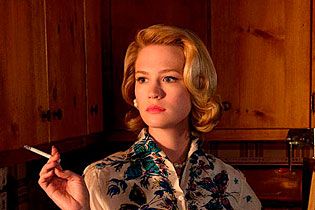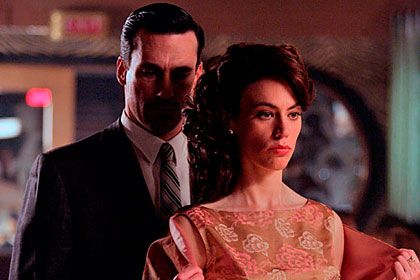Mad Men’s season-four premiere raised all sorts of new questions about Don’s sexual identity: What really turns him on? What’s his type? What’s his fantasy? A review of Don’s sexual history reveals a few interesting things, and none looms larger than the fact that Don has been more attracted to fantasy versions of the women he meets than the women themselves. So — SPOILER ALERT if you haven’t watched the premiere yet — is Bethany just another, younger Betty? And why does Don need to be slapped while having sex with the prostitute? Looking back, it seems crazily Oedipal; sleeping with the escort would seem to confirm his biggest fear: that he’s just like his father, another sleazy John. For Don’s complete sexual history, click away.
The woman: Don’s wife is a former model and graduate of Bryn Mawr (anthropology!) who gave up her career to be Don’s wife and a suburban mother in Ossining. Also: handy with a shotgun.
The fantasy: The perfect wife. Completing the illusion of Don Draper: Dashing Ad Man, Don needed a wife to play her part. A model, Betty was happy to get all dolled up and play her role. At first. Early in the series, Don brushed away any serious conversation with her and treated her, essentially, as an accessory, a prop. Eventually, he seems to understand her a bit more clearly — but by then it’s too late.
How it ends: A spectacular series of betrayals and revelations confirm Betty’s suspicions that the real Don, Dick Whitman, is not the fantasy person that Betty had imagined either.
The woman: Independent, witty, and well aware of the downtown bohemian hep-cat scene, Midge, played by Rosemarie DeWitt, is a confident, brunette art illustrator who’s not overly impressed with Don and the Suits in midtown. She’ll drop a TV out a window without a second thought.
The fantasy: Wild, sexually aggressive bohemian dreamgal. She calls him at the office, saying, “Pull my hair and ravish me and leave me for dead.” Don dreams of leaving it all behind and escaping with her to café culture in Paris. “Grab a bag,” he tells her — but she’s stoned with her beatnik pal.
How it ends: Don takes a Polaroid and notices something genuine between Midge and her male friend. Perhaps realizing how superficial it’s all been, Don stuffs his bonus check down her bra and leaves.
The woman: Powerful, sharp, whip-smart Jewish department-store scion who seems a half-step ahead of Don at every turn.
The fantasy: The exotic equal. Don clearly admires her brass, her aggressiveness, and her success. Though running the family business, she seems to be a self-made success like himself. He dreams about starting all over with her, moving to Los Angeles, and beginning again.
How it ends: “I don’t know if I understand how this works or where it goes,” Rachel says early in their affair. “I’m worried this is a fantasy.” Soon, she’s convinced. When Don proposes that they escape to Los Angeles, she looks at him as if he’s pitifully deluded — knowing that he wants a clean slate more than he wants her. Soon, she marries and leaves him wondering about what might have been.
The woman: A relatively shy redheaded twin that Roger picks up at a casting call for some in-the-office fun.
The fantasy: More Roger’s diversion than Don’s fantasy, Eleanor is the kind of uninteresting, young one-night-stand gal that doesn’t really turn Don on.
How it ends: Cardiac arrest.
The woman: Bobbie, red-haired wife and manager of comedian Jimmy, is a pragmatic sexual tactician who has mastered the “powerful business” of being a woman in a man’s world.
The fantasy: Bobbie is Don’s opponent, and nearly an equal on the sexual battlefield. “I like being bad and then going home and being good,” she says — zeroing in on Don’s kink. Few have played the dynamics of sexual power better than Bobbie, who all but forces Don to sleep with her in the taxi in exchange for handling her husband (Don scrubs his hands clean afterward in his kitchen). Then Don finger-blasts her by the coat check to even things out — but it still doesn’t work for him. “I feel nothing,” he tells her before they wreck a car.
How it ends: After Bobbie points out that “the full Don Draper treatment” (implying aggressive, rough sex) is the stuff of legend, Don ties her up to the bed and leaves her there, telling her, “I am not like you” — disturbed because he’s clearly afraid that it’s true.
The woman: A young free-spirit brunette with a wealthy weirdo family.
The fantasy: The escape fantasy. Joy represents pure hedonism: skinny-dipping, heavy-drinking, globetrotting, irresponsible fun. If Don ever wanted to run away from everything and disappear, this was his opportunity.
How it ends: Don decides he must face his past. He calls the real Mrs. Draper and leaves.
The woman: Don’s first blonde love interest since Betty, this flight attendant is a relatively simple-minded and silly work-trip diversion.
The fantasy: The work-trip playtoy. Don picks her up, buys her dinner, and seems practically bored by the affair before they even get to the bedroom: “I keep going different places,” he says, “and always winding up where I’ve already been.”
How it ends: In flames.
The woman: Sally’s brunette teacher has a mysterious brother, a naughty streak, and a good handle on Don. “I’m new and I’m different,” she says. “Or maybe I’m exactly the same.”
The fantasy: The embodiment of squeaky-clean maternal goodness. Just when things have gotten the most complicated with Betty, Don imagines Suzanne to be a dancing, maypole vision of simple idealistic virtue. Don asks her if she’s “dumb or pure.” Clearly, she’s neither dumb nor pure — but Don wants to imagine her as some simpler option.
How it ends: We last see her idling in his car as they prepare to take a sweet vacation to the beach. On the phone with her later, Don is touched that she would care about his troubles: “Only you would ask about that now … “
The woman: Bethany is a young, blonde, picture-perfect gal pal of Roger’s ladyfriend Jane, who has seen Don’s tricks before but enjoys getting dressed up anyway.
The fantasy: A simpler, younger Betty? As our commenters
have pointed out, it’s notable that Bethany is not only a supernumerary (an opera stand-in) but also the kind of gal who can wear another girl’s dress. She looks more like Betty than any other girl Don has seduced, and that fresh blonde, young, and naïve cuteness is the opposite of the anti-fantasy that Don is running away from: the prostitute who birthed him.
How it ends: To be continued.
The woman: A bombshell working girl with curves, Joan-like red hair, and a family at home.
The fantasy: The mother/whore. This is where things really get interesting and crazily Oedipal: It’s not just scandalous that Don has hired a prostitute — Don’s never been much for working girls, but he indulges in all sorts of illicit behavior — it’s fascinating because Don is deeply ashamed that his own mother was a prostitute. Maybe he wants to be slapped because he feels guilty about betraying everyone he knows with the constant falsehood of his identity. More likely, it’s to be punished for living up to his biggest fear: that he’s just like his father, another lousy John paying a prostitute for intimacy.
How it ends: Also to be continued.















